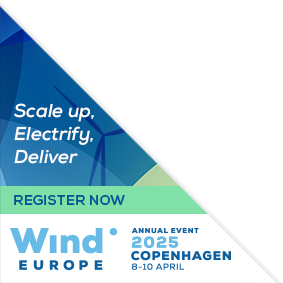Posters
Siblings:
ProceedingsProgrammeSpeakersPostersContent PartnersPowering the FutureMarkets TheatreResearch & Innovation in actionStudent programmePresenters dashboardCome meet the poster presenters to ask them questions and discuss their work
We would like to invite you to come and see the posters at our upcoming conference. The posters will showcase a diverse range of research topics, and will give delegates an opportunity to engage with the authors and learn more about their work. Whether you are a seasoned researcher or simply curious about the latest developments in your field, we believe that the posters will offer something of interest to everyone. So please join us at the conference and take advantage of this opportunity to learn and engage with your peers in the academic community. We look forward to seeing you there!

PO217: POSTER AWARD WINNER - Wind resource assessment: how to include Climate Change impact on wind farm development
Luca Bortolotti, Wind Energy Engineer, ENI Plenitude
Abstract
Accurate and precise Wind Resource Assessments (WRA) are central for the development of sustainable and competitive wind farms. Still, the standard approach to the WRA possess inherent uncertainty in the average wind speed, which can make the difference between profitability and net loss of the wind farm. Recent advances in weather data collection, processing and long-term correlation techniques are improving wind assessment accuracy, but there is a rarely discussed topic at the industrial level: are we sure that the wind assessment made today will be representative of the wind conditions in the next 20 years? Climate Change is already impacting the local conditions all over the world and its effects will be more evident in the next decades. A recent scientific review [Climate change impacts on wind energy resources in North America based on the CMIP6 projections, A. Martinez and G. Iglesias, https://doi.org/10.1016/j.scitotenv.2021.150580] has determined that the average wind speed in North America could deviate up to 10% over the next 30 years. ENI Plenitude, in collaboration with Geoskop, is validating this issue and developing a solution to it. By combining wind data from WRAs with Intergovernmental Panel on Climate Change (IPCC) climate models and with Geoskop algorithms, wind speed time series that include the Climate Change signal can be predicted. Thus, instead of blindly assuming that observed wind conditions will remain unchanged through the years, the climate evidence could be included in ENI Plenitude's WRAs. Some proofs of concept of this technology gave notable results, showing the possibility of achieving a better accuracy in the Annual Energy Production estimations. The goal is to develop a new procedure to assess the rarely considered uncertainty related to Climate Change. Such knowledge, applied to WRAs, can help improve the economic and technical development of future wind farms.










